There has perhaps never been a more vivid example of the dynamic between collective solidarity and selfish individualism than in the last year. I was thinking a lot about these aspects when watching the otherwise incongruous films from LFF on this fifth day of reviews, their disparate visions of isolation and engagement inducing a swathe of emotions within me. These varying depictions of hope and futility subsequently tap into the best and worst we have to offer for one another in a global society, and the uncompromising intelligence of these films speak as clearly to a COVID-era longing for stability as anything else I’ve seen at the festival.
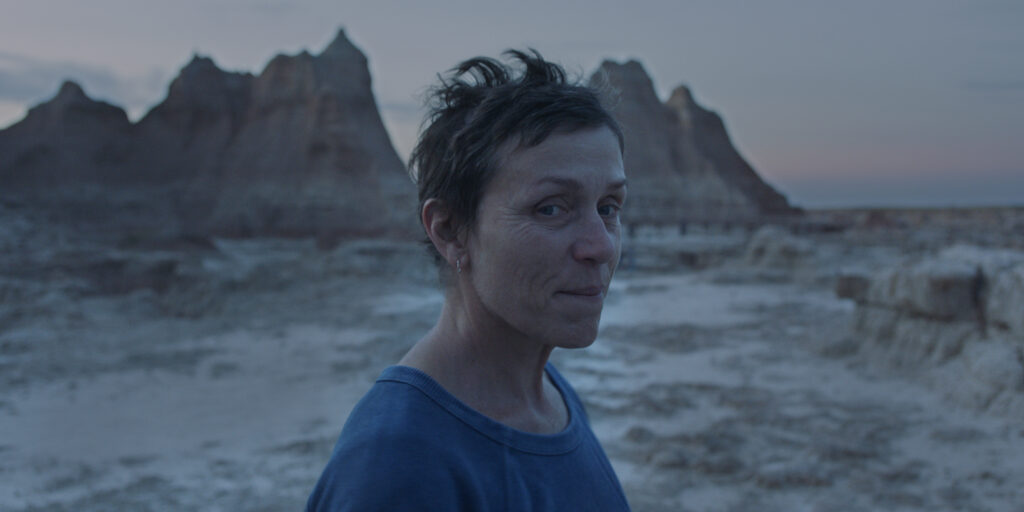
Henri Frederic Amiel once said that “any landscape is a condition of the spirit”. The spirit of the America within the cinema of Chloé Zhao is bathed in hues of dusk, her figures dotting the landscape like an Andrew Wyeth painting. Zhao’s visual language has drawn on many cinematic touchstones, most clearly the work of Terrence Malick, yet with a small corpus she’s maintained a piercing inquisitiveness for that which fuels the resilience of those who dwell upon the fringes of American society. Nomadland (5/5), her third feature, marks her first collaboration with several professional actors, yet it has lost none of the poetic realism of her earlier films. Rather, it marks an artistic development for a filmmaker whose compassion for the forgotten, as well as their anger and sorrow, seemingly knows no limits.
The film, which courses through much of the western United States, originates in Empire, Nevada, which closed its gypsum mine in 2011 and, consequently, became a ghost town. Fern is one of the hundreds left to wander the plains and deserts in her rickety van, which she’s christened “Vanguard”, in search of part-time work which will allow her to continue moving. Fern is played by Frances McDormand, whose weathered mien is a study of stoic, perceptive fortitude. McDormand has played intrepid, sometimes brazen figures who stand as a ballast against injustice before. Yet Fern’s resourceful ingenuity often borders on the myopic. Her unwavering dedication toward maintaining her mobile home, containing both random bric-a-brac and mementos of the life she led with her late husband, is so fervent that she cannot permit herself to even consider the possibility that Vanguard is, as a friend brusquely calls it, a bit ratty.
That friend, a seventy-five year old woman named Swankie, is one of many itinerant souls Fern encounters as she drives across the American Southwest. She was featured in Jessica Bruder’s non-fiction book of the same name, and several other subjects from Bruder’s book appear in Zhao’s film as lightly fictionalized versions of themselves. One of them, Linda May, is a close friend of Fern, and it’s a testament to McDormand’s intelligence as an actor that their relationship is completely devoid of phoniness. Their conversations, as with many between the “real” and “fictional” characters in the film, articulate the dreams and despair that underskirt their way of life. This strain of neorealism informed Zhao’s earlier work, yet where Songs My Brother Taught Me and The Rider told stories of indigenous communities, Nomadland is attuned to the plight of predominantly white, blue-collar Americans who take on part-time gigs at Amazon or small restaurants.
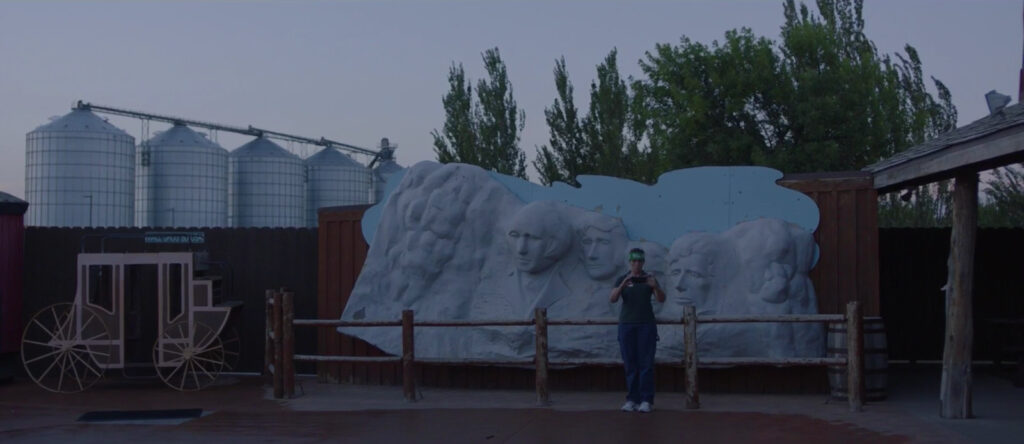
Fern’s insistence that she likes to work indicates an insidious pattern which conditions a culture of perpetual servitude for vulnerable Americans. Yet Zhao is not a didact of righteous anger, but a chronicler of communities which shape the physical and psychological terrain of America. Geological formations are markers of a national character, like the traces of red, white and blue Swankie shows Fern in her collection of framed rock portraits. Dinosaur bones are as much mythic symbols of a cosmological significance as they are cheap, inlaid facets of lighters sold in gift shops. But Zhao never fetishizes the starkly grim circumstances which have shaped Fern into both a survivor and grieving widow. The romantic pursuits of a fellow nomad named Dave (David Strathairn) nimbly encapsulates the shared loneliness which makes both him and Fern utterly incompatible, all without betraying their dignity or lessening the fleeting yet meaningful impact they have on the lives of one another.
If Fern is, as her estranged sister Dolly puts it, part of an American tradition, the miraculous accomplishment of Nomadland is its canny acknowledgment, and ultimate complication, of the rugged individualism this nation propagates. The mythic allure of perpetual motion, as a social construct and psychological coping mechanism, is felt in the film’s episodic structure. Yet Zhao transitions between these sequences with poetically assembled passages that echo the gradual erasure of a key element of Fern’s identity. The film gently ponders what it means to reconcile oneself with loss, and what can be built from the ashes of American industry. As Shakespeare, whom Fern quotes at several moments during the film, once said, “This our life, exempt from public haunt, finds tongues in trees, books in the running brooks, sermons in stones, and good in everything.” By passing through a tempest of sorrow, Nomadland helps us regain sight of the good in America.

You couldn’t find a more wildly different film from Nomadland than Possessor (3/5). The heroine of Brandon Cronenberg’s cerebral sci-fi thriller finds herself at an impasse, though her own identity is threatened by far more spectacular circumstances than anything in a Chloé Zhao film. Brandon’s second feature beggars the inescapable comparison to his famous father, David, in its contemplation of the violence done to and by the human body, all within a chilly emotional register. Where the younger Cronenberg tries to make his own mark is in his own exploration of genre through a disjunctive, associative editing style as violent as the gory set pieces which unfold in unsparing detail.
Tasya Voss (Andrea Riseborough) is an operative working for a company that specializes in performing hits through the possession of other human hosts via brain implants. She’s the “star performer” of the company, yet has begun exhibiting signs of lagging, which concerns her boss, Girder (Jennifer Jason Leigh). Her latest assignment has her commandeering the body of Colin Tate (Christopher Abbott), a menial drone at a data mining corporation who is dating the daughter (Tuppence Middleton) of his boss and Voss’ target, John Parse (an enjoyably arrogant Sean Bean). To say things don’t quite go according to plan would be an understatement.
The motivation of the assassination is purely for profit; Parse’s stepson, Reid, orders the hit and the company intends to blackmail him as a means of procuring their own stake in the Parse corporation. Cronenberg doesn’t belabor his damning vision of cutthroat capitalism, relying primarily on Rupert Lazarus’ highly industrialized production design to convey the symbiotic relationship between employer and underling. Tasia’s stretcher she lies on while linked with her host bodies is connected to Girder’s reclining chair, a visual detail rife with umbilical connotations. Familial estrangement is a key theme of Possessor, with Tasia’s own mental decay causing her to disassociate from her husband Michael (Rossif Sutherland) and their son Ira (Gage Graham-Arbuthnot). When Tasia watches her child sleeping, she sniffs him out of benign curiosity, like an animal eyeing a potentially edible snack.
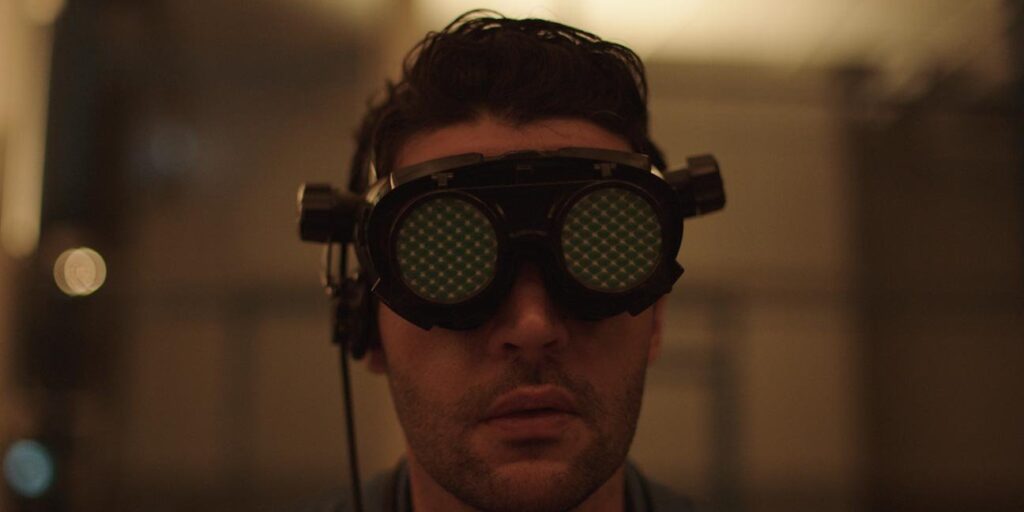
Cronenberg’s script leans heavily into the psychological friction that fuels the film’s nightmarish imagery. Screaming faces contorted in warped, wide angles flash onscreen with furious, if visually monotonous, frequency. By drawing particular attention to the malleability of the body, particularly during the dazzling melting and reconstitution of human forms during the initial possession process, Possessor biologically localizes a power struggle that ultimately devalues the physical boundaries of a corporeal prison. The most graphic violence, rendered in explicit close-ups, betrays Tasia’s growing disdain for what she regards as an expendable asset. Yet the film’s most provocative aspect of its brutality is in how Voss and Tate’s dormant rage conjoins to the point where distinguishing between who is in control becomes irrelevant.
The savagery masked behind a respectable veneer is not a fundamentally novel concept. Where Possessor struggles, then, is distinguishing both its thematic and aesthetic characteristics from its generic progenitors, including, of course, several by the elder Cronenberg. The disintegration of familial bonds, if not their complete absence, makes it deliberately difficult for audience identification with any of the characters. Additionally, there is a predetermined aura around the denouement of Possessor which makes its final passages feel disappointingly predictable, doubly so for a film possessing (if you’ll forgive the pun) genuine ambition. Brandon Cronenberg’s surfeit of nihilism lacks the queasy power of something like David’s The Brood, primarily because he has all of the cold intelligence of his father with little of the underlying anguish. What Possessor ultimately amounts to, then, is a slick midnight movie made by a talented filmmaker still searching for his distinct voice.
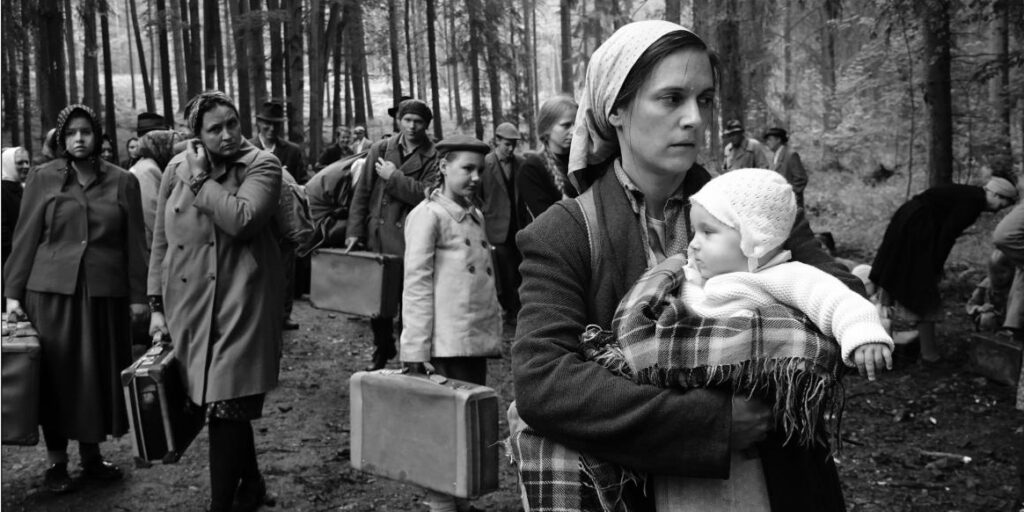
The depths of human evil are plumbed further still in Bohdan Sláma’s Shadow Country (Krajina ve stínu) (4/5), though it’s as far away from science-fiction as you could possibly get. Dramatizing real-life atrocities in Czechoslovakia during the Second World War, Sláma methodically charts the disintegration of a small village community on the Czech and Austrian border in morally gray shades complemented by the film’s monochromatic palette. By honing in on pre-existing prejudices between Czech and German citizens alike, Shadow Country’s specificity illumines the toxic endurance of harsh, disciplinarian tactics endemic to a hierarchical social schema exacerbated by, though not confined to, fascism.
Spanning nearly two decades within the village of Tušt’, Sláma examines the impact of Nazi occupation on the village’s denizens, favoring wide tracking shots that depict the townspeople within a communal context. The decisions these characters make in either publicly accepting or privately defying the Germans are determined as much by self-preservation as they are ideological alignment. Karel (Stanislav Majer) insists on retaining his German citizenship to secure larger subsidies for his family’s property, a decision his wife Marie (Magdaléna Borová) discourages. “You’ve been doing business with them your whole life!”, she chides Karel, an accusation borne from the contentious geographic partitioning the film’s opening crawl provides as context for Czechoslovakia’s history under Habsburg rule. The power afforded by national alignment spares and condemns the townspeople in equal measure, and how that nationalism shifts provides the crux of the film’s transition into its second half.
One of the townspeople, Josef (Csongor Kassai), collaborates with resistance fighters before he is sent to a concentration camp. Most of his Jewish family either flees or is killed, yet he survives and returns to Tušt’ after the war. Upon doing so, he becomes a central figure in a series of actions which exile a number of villagers to Austria and prosecute several others on charges of treason. The strongest passages of Sláma’s film chart this violent transfer of power and the rage exploited by both opportunists and former victims alike. Marta (Bára Poláková), a loyal soldier for the Third Reich, gradually shifts from exuding smug superiority to a broken shell of her former self. Sláma doesn’t revel in this degradation, and it is the complex ambivalence his characters embody that gives the creeping horror of the film’s second half it’s unnerving power.
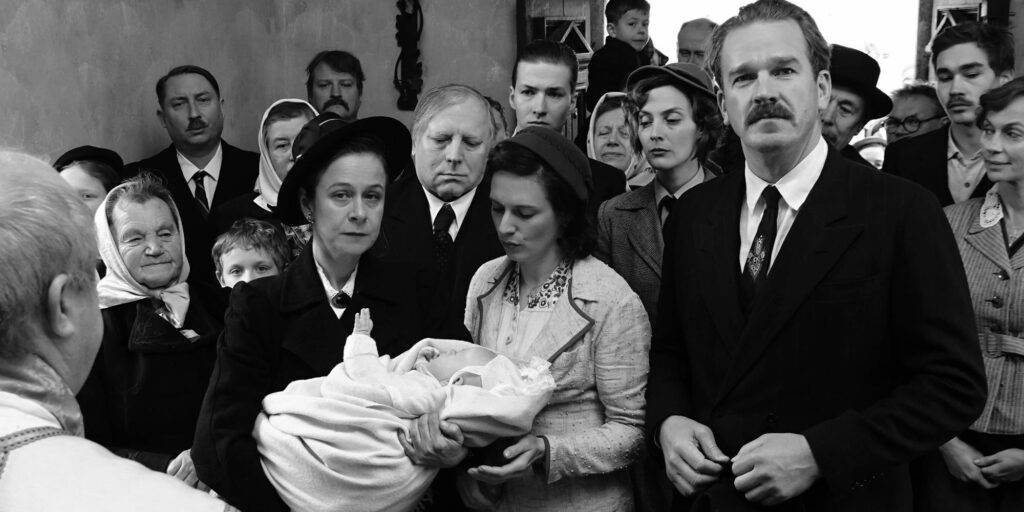
The atrocities depicted onscreen, based in large part on a real-life massacre that the Czech government failed to apologize for, let alone acknowledge, until the 1990s, could have resulted in a deeply problematic case of false equivalence. Thankfully, the film is too intelligent to stoop to a simplistic dichotomy. Shadow Country doesn’t exploit the iconography of the Holocaust, choosing instead to linger on the village’s growing sectarianism nurtured by the evils of fascism. Soldiers who do return are mangled or disillusioned, and those who don’t leave their families inconsolable. Moreover, the film warily pinpoints a strain of self-serving cynicism as several villagers, including an unscrupulous cretin named Otto (Robert Miklus), align themselves with whoever comes to power. The tragedy of the film, then, is how the unspeakable trauma inflicted by the Holocaust fueled the rage of those seeking retribution, destroying what remained of their community in the process.
Sláma’s previous films, mostly intimate chamber dramas, could not quite portend the scope he would apply to what is ostensibly an historical epic aesthetically and thematically reminiscent of Haneke and Tarkovsky. His strict chronicling of key historical moments causes the rhythm of the film’s final stretch to feel slightly schematic, particularly in comparison to the naturalistic, patient discipline of the first half’s pacing. Nevertheless, Shadow Country remains a convincing dramatization of how human rancor destroys the cultural topography of communities, it’s intelligence entrusting its audience to understand how the diminished value of human lives shapes a tragically cyclical history.
Tomorrow:
New work from Tsai Ming-liang, Lav Diaz, and Michel Franco. Plus Regina King’s directorial debut.
